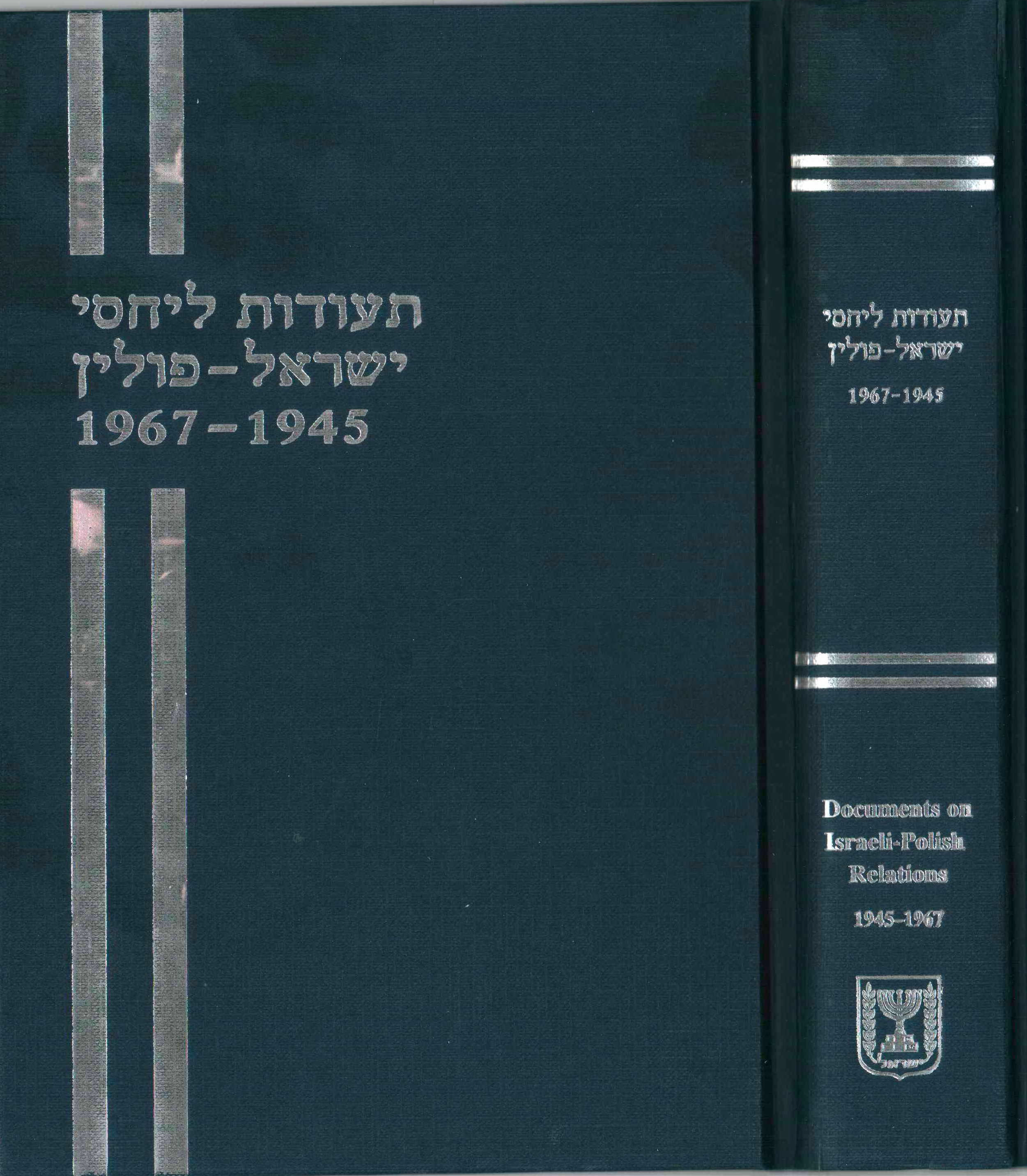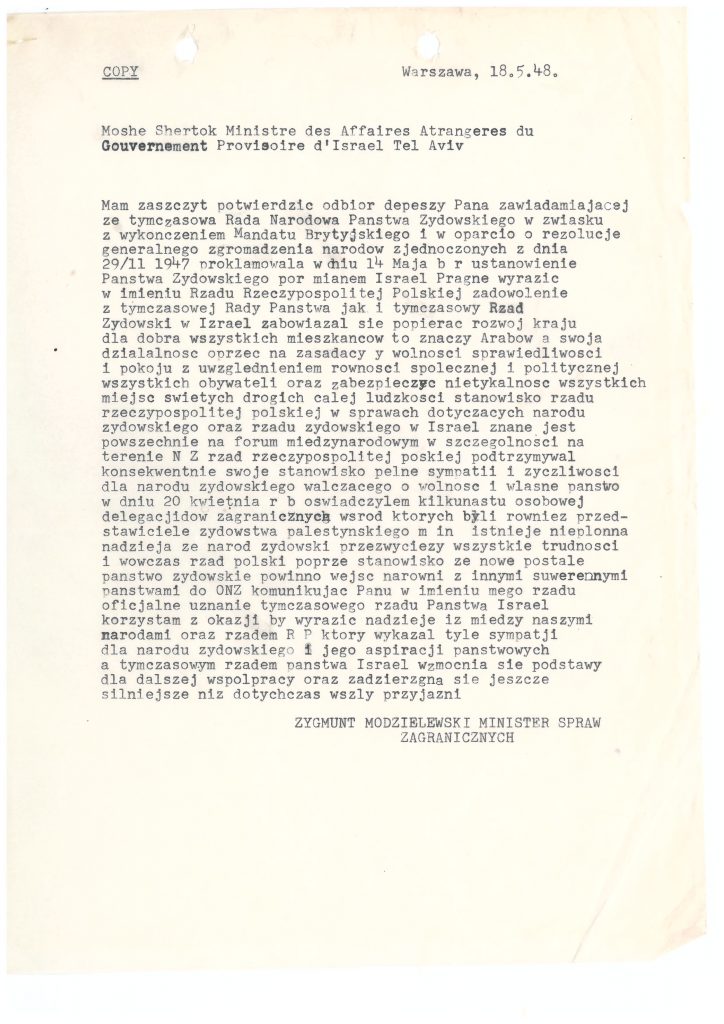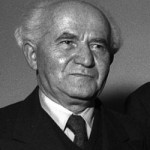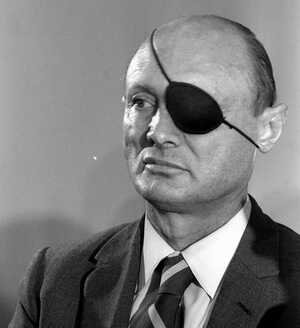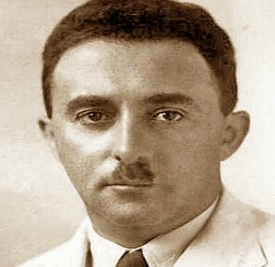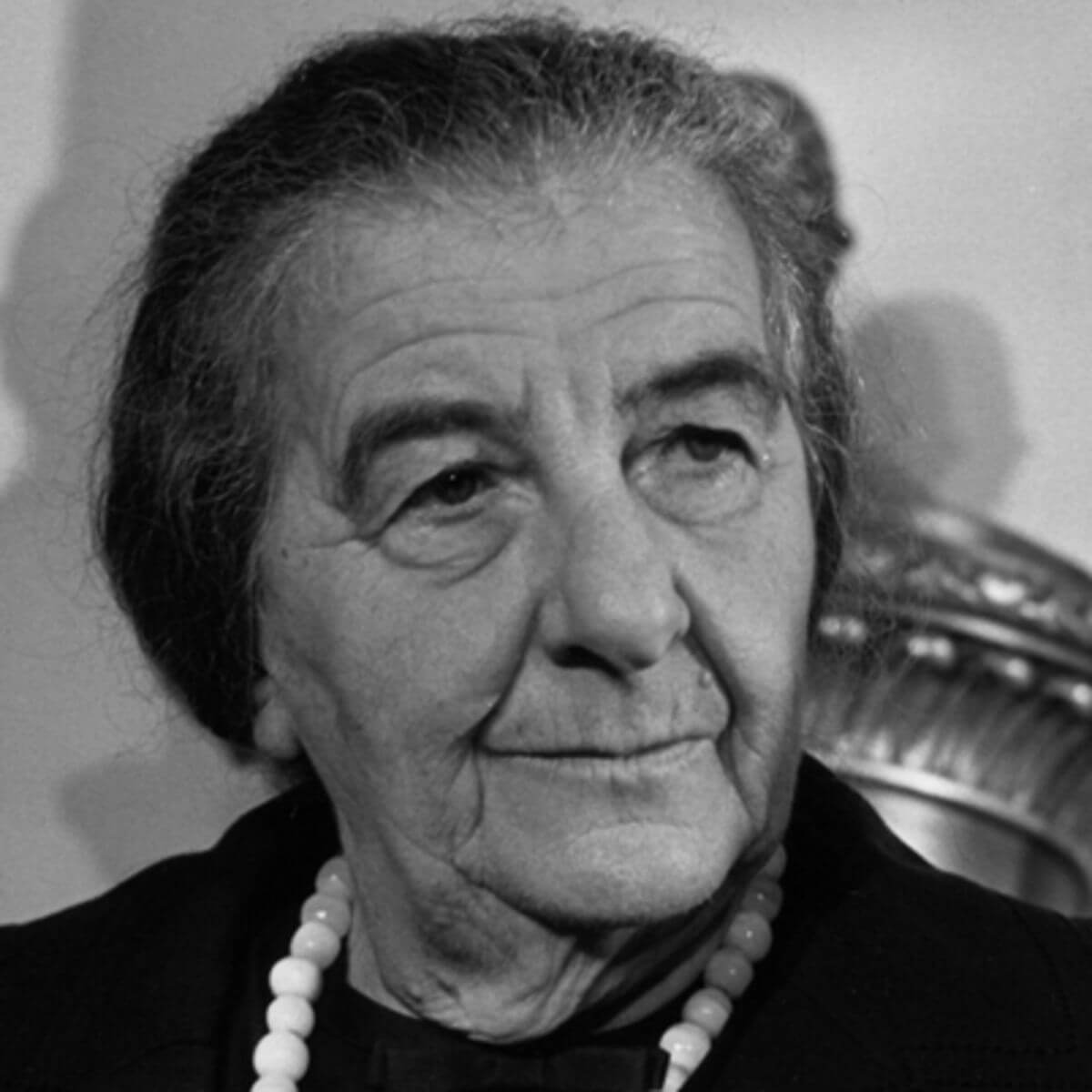The links appearing here will shortly be updated. Meanwheile please see the ISA’s Hebrew website, which also gives a list of the main volumes in Hebrew..
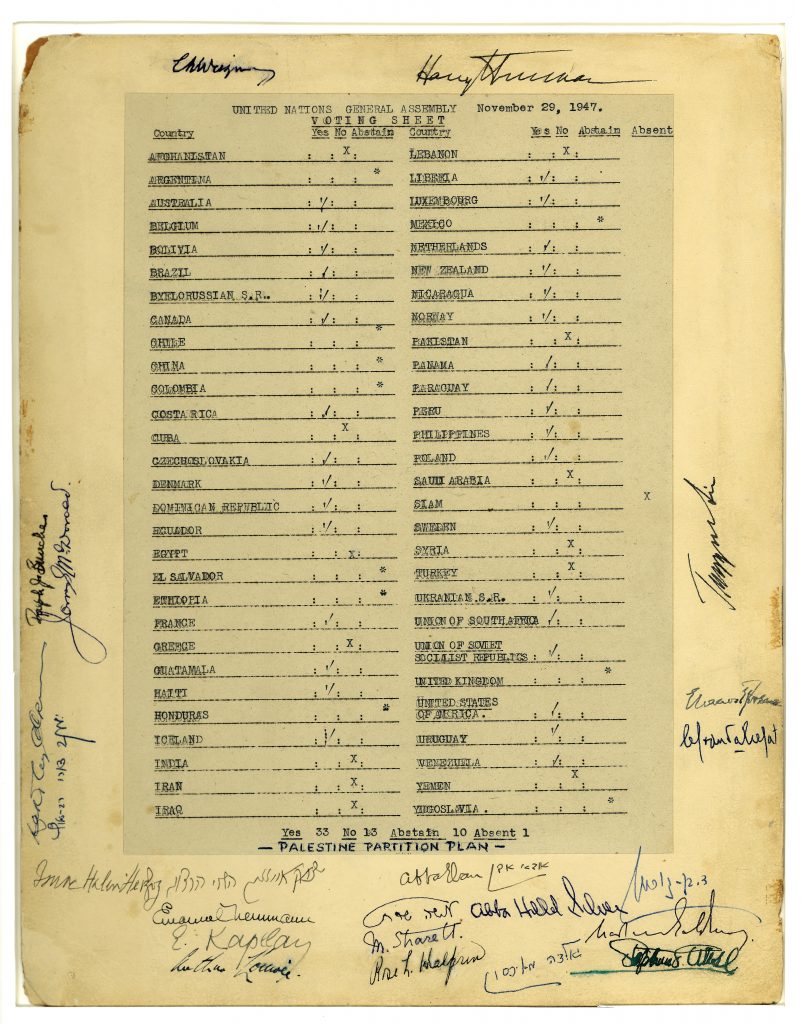
Preliminary Volume
Political and Diplomatic Documents, December 1947 – May 1948
Edited by Gedalia Yogev. A joint project with the Central Zionist Archives. Jerusalem, 1979.
Covers the period from the adoption of a resolution on the partition of Palestine by the UN General Assembly to the establishment of the State of Israel.
Documents on the Foreign Policy of Israel
Vol. 1. 14 May 1948-30 September 1948
Edited by Yehoshua Freundlich. Jerusalem, 1981.
Gives an account of the period following the Declaration of Independence, the War of Independence and its diplomatic and political repercussions, the creation of the Arab refugee problem and Israel’s search for recognition and sources of arms and financial aid. The volume also describes the establishment of the Ministry of Foreign Affairs, headed by Moshe Sharett (Shertok).
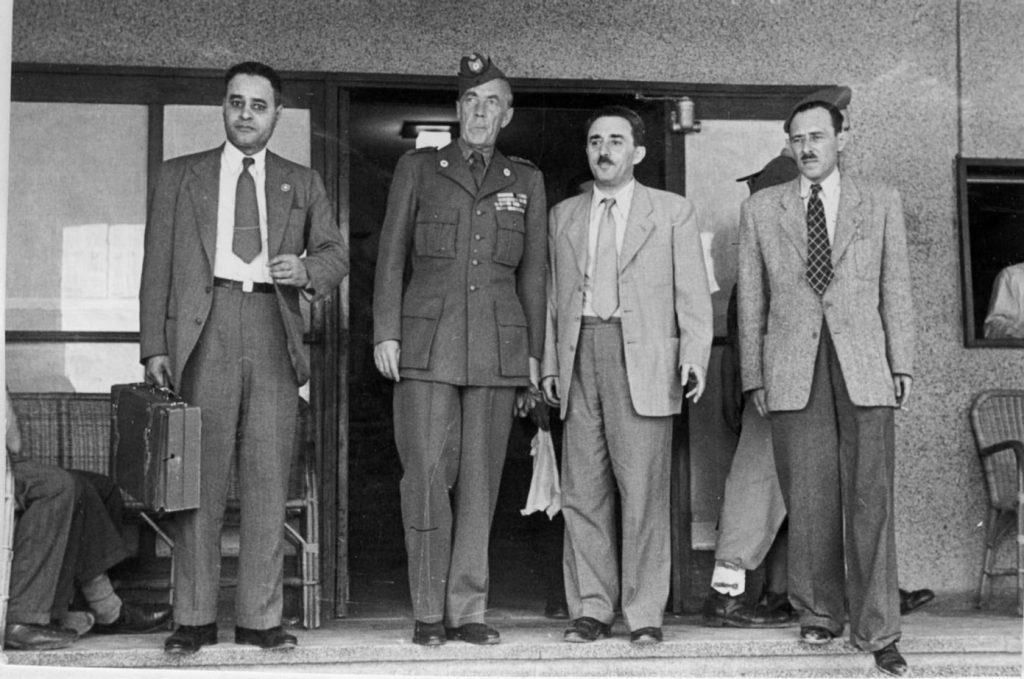
L.to R., Ralph Bunche, the assistant to the UN Mediator, Count Folke Bernadotte, the UN Mediator, Foreign Minister Moshe Sharett and a Foreign Ministry official
Vol. 2. October 1948-April 1949
Edited by Yehoshua Freundlich. Jerusalem, 1984.
Focuses on the end of the War of Independence and Israel’s attempt to establish its international status. Deals with issues including the struggle against parts of the report of UN Mediator Folke Bernadotte at the General Assembly; the political situation following the Yoav and Hiram operations in the fall of 1948; the establishment of the Conciliation Commission; the question of the status of Jerusalem and the Arab refugees.
It also describes Israel’s efforts to gain acceptance to the UN and contacts with Arab countries which led to the armistice agreements (see Vol. 3).
Vol. 3: Armistice Negotiations with the Arab States, December 1948-July 1949
Edited by Yemima Rosenthal. Jerusalem, 1983
The third volume diverges from the chronological format and focuses on the armistice agreements between Israel and its neighbours. 358 documents reveal details of the talks that took place separately with Egypt (January 6 – February 24, 1949); Lebanon (January 14 – March 23, 1949); Jordan (March 4 – April 3, 1949); and Syria (April 6 – July 20, 1949). They were held under the auspices of the UN and of Ralph Bunche, the acting mediator after the assassination of Bernadotte. They differed in character, due to the military and geopolitical differences on each front and differences in the temperament of the negotiators. They show the hopes of the Israeli representatives for an early peace settlement, but also the shortcomings and compromises that later damaged the implementation of the agreements.
Includes the official Hebrew and English texts of the agreements and maps.
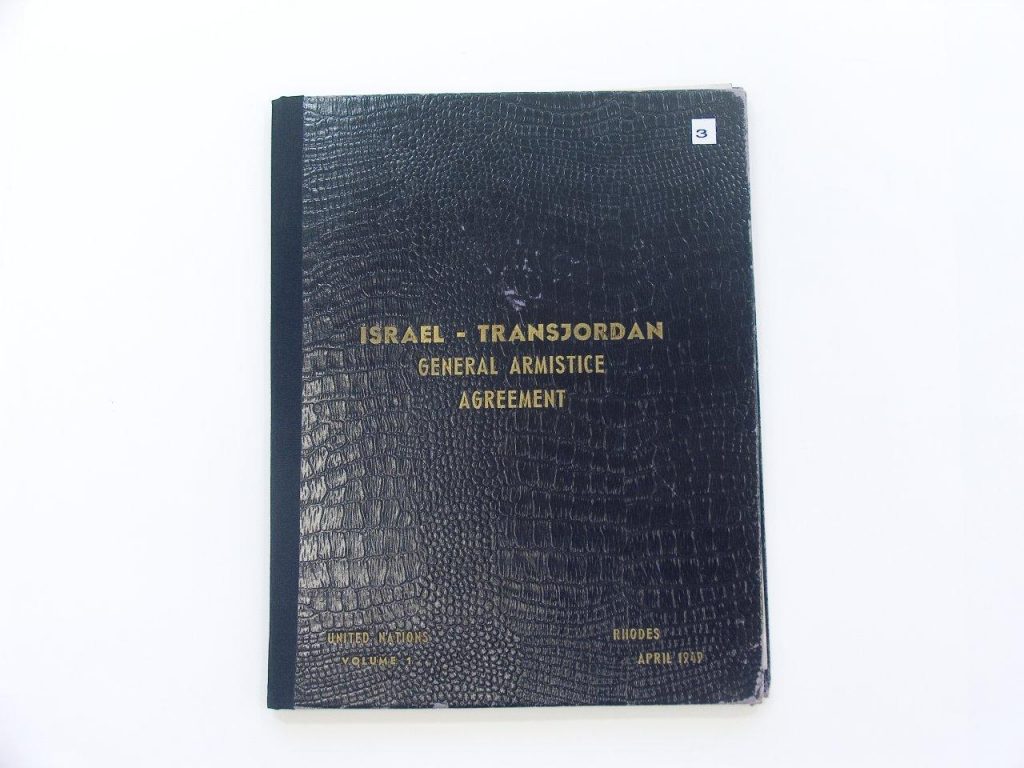
Edited by Yemima Rosenthal. Jerusalem,
The axes around which foreign policy revolved in these months were the conference convened in Lausanne by the Conciliation Commission (April-September) and the UN General Assembly. In Lausanne the main issues were the fate of the Arab refugees and border arrangements. Israel argued that the final borders should be based on the armistice lines and that the Arab countries were to blame for the refugee problem and should resettle them. The Arabs rejected Israel’s offer to accept 100,000 refugees and the conference broke up.
The focus at the General Assembly was on Jerusalem. On December 9, the Assembly adopted an Australian resolution calling for its internationalization. In response, the Israeli government decided to declare Jerusalem its capital and move its institutions from Tel Aviv to Jerusalem.
Edited by Yehoshua Freundlich, 1988
This was a year when Israel did not face urgent or existential decisions. Although the war ended without a peace treaty, Israel kept in contact with its neighbours, especially the Kingdom of Jordan, and hoped for a more stable settlement. But the documents also reveal stumbling blocks: economic dependence on the US ; the proliferation of border incidents and the Arab states’ threats of starting a “second round” against Israel. The Western powers sought to ensure stability through the “Tripartite Declaration” on their opposition to any violation of national borders in the Middle East. Israel’s relations with the Soviet Union suffered from difficulties exacerbated by the West’s decision to intervene in the Korean War and Israel’s support for UN policy on this issue. Israel still sought to maintain an independent line, recognizing Communist China and supporting its entry into the UN, contrary to the US stand.
Edited by Yemima Rosenthal. Jerusalem, 1991
The main issues in 1951 were the conflict with the Arab states, Israel’s place in the international system and reparations from Germany. The documents deal with the Hula dispute with Syria; contacts on a settlement with Jordan until the assassination of King Abdullah in July 1951; the problem of the passage of goods to Israel in the Suez Canal; Arab refugees and the conference between Israel and Arab states in Paris. They also reveal British General Robertson’s talks in Israel in February 1951, which did not lead to British-Israeli cooperation, as Prime Minister David Ben-Gurion had hoped, and diplomatic preparations for opening talks on a reparations agreement with West Germany.
Edited by Yehoshua Freundlich. Jerusalem, 1992
Describe the shift in Israel’s foreign policy from non-alignment to a policy leaning towards the West and a failed attempt to join a pro-Western regional defence organization. Israel also abandoned its approach which considered Jordan to be the first Arab partner on the road to peace and attempted to reach a settlement with Egypt. Also focuses on negotiations on a reparations agreement with West Germany, leading to the signing of the Agreement in Luxembourg on September 10th 1952.
Edited by Yemima Rosenthal. Jerusalem, 1995
President Eisenhower’s assumption of office in January 1953 led to changes in US policy, which began to focus on strengthening American standing in the Arab states, in contrast to the previous Administration’s discrimination in favour of Israel. The documents describe Foreign Minister Sharett’s visit to the US. and the visit of US Secretary of State Dulles to the Middle East, and steps taken by the Administration, which caused much concern in Jerusalem. Relations with the Soviet Union also deteriorated during the last days of Stalin’s life, and accusations against his Jewish doctors caused a stormy reaction in Israel, culminating in an attempt to bomb the Soviet legation in Tel Aviv. Relations between the two countries were severed, and renewal of ties was contingent on Israel’s pledge not to join an anti-Soviet alliance.
Relations with the Arab states centred on high-level talks on the division of the Demilitarized Zones between Israel and Syria; the project to divert water from the River Jordan and tension on the Jordanian border which led to the retaliatory attack on the village of Qibiya on 13 October 1953. The operation led to an outcry against Israel and condemnation by the U.N. Security Council.
Edited by Naomi Barzilai. Jerusalem, 2004
Deals with the effects of negotiations between Britain and Egypt on the evacuation of the Suez Canal region; the attempt to set up a regional British-American defence system and the Soviet Union’s increasing support for the Arab states, reflected in another veto at the U.N. Security Council. However relations with France became closer and it gradually became Israel’s main arms supplier.
Tension on the borders, especially with Jordan and Egypt, led to violent incidents, and PM and Foreign Minister Moshe Sharett tried to implement a policy of restraint. Talks were held with Egypt on this issue, the restrictions on the passage of Israeli vessels in the Suez Canal and in the Straits of Tiran; and the exposure of a Jewish sabotage network in Egypt, whose members were caught and tried. They culminated in an exchange of messages between Sharett and President Nasser.
Vol. 10 1955.
No companion volume was published. See the Main Volume for an introduction and a list of documents and summaries in English
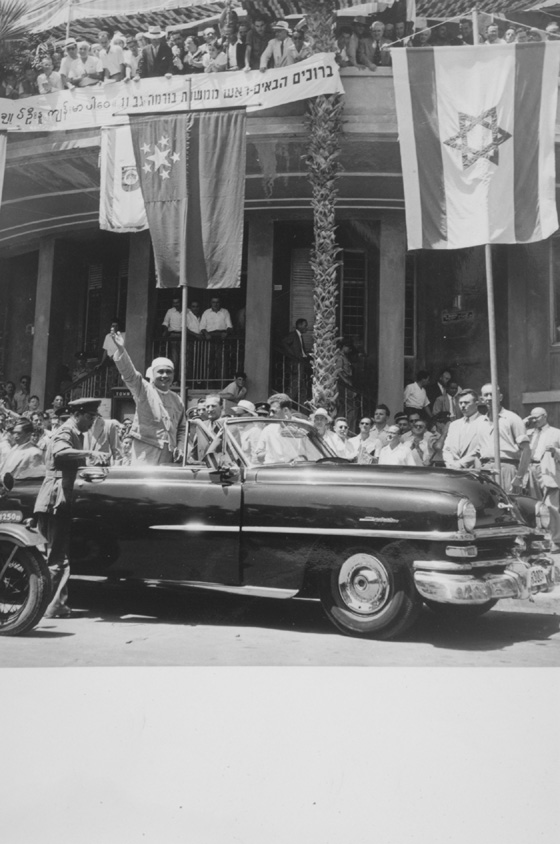
U Nu, the prime minister of Burma (Myanmar), visits Tel Aviv, May 1955. GPO.
Edited by Baruch Gilead. Jerusalem, 2008
Presents Israel’s efforts to buy defensive weapons from several European states and from the US, efforts which were in vain in America and only partially successful in Britain, Italy and Canada. However, the close relations with the French establishments led to the opening up of France’s arms stores to Israel. France took Israel into its confidence over the French-British plan of attacking Egypt, in response to Egypt’s nationalisation of the Suez Canal on 26 July. France proposed that Israel take an active part in this campaign. The final talks between the three states took place in Sèvres, near Paris, between 22-24 October. The volume ends on 29 October, the day the Sinai Campaign began.
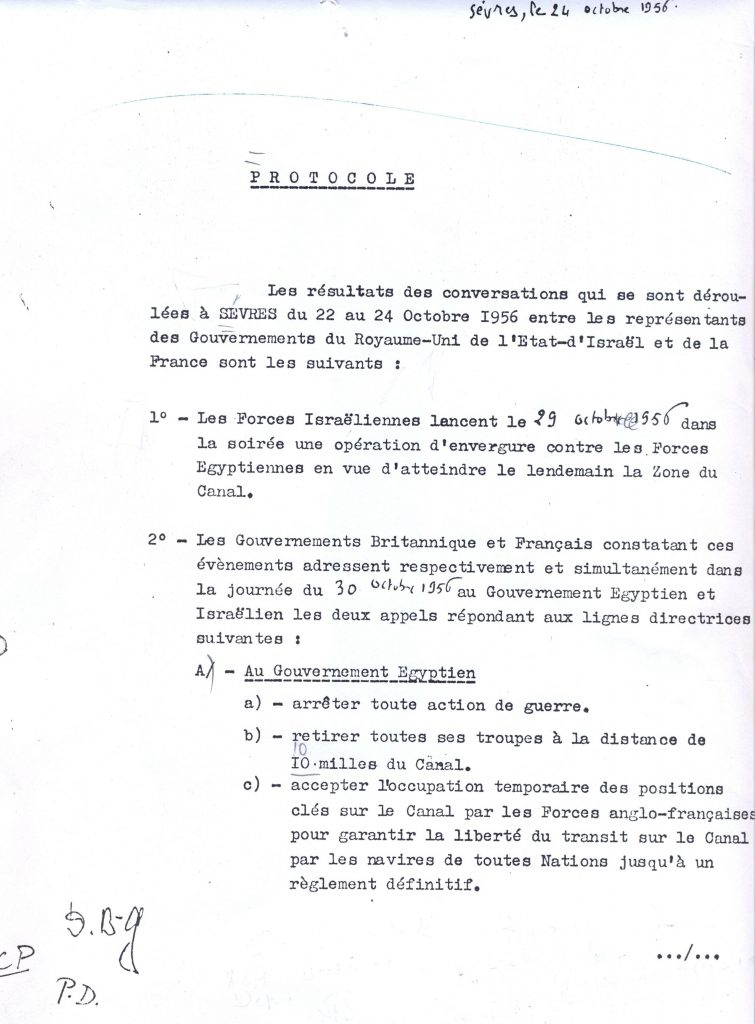
The first page of the Sèvres Agreement, 24 October 1956. Ben-Gurion Archives
Vol. 12: The Sinai Campaign: The Political Struggle, October 1956-March 1957
Edited by Nana Sagi. Jerusalem, 2009
Vol.12 starts where Vol. 11 ended, with preparations for Israel’s operation against Egypt and the invasion of Gaza and the Sinai Peninsula known as the Sinai Campaign. It focuses on the political and diplomatic struggle during and after the war and its political and military results, telling the story of Israel’s confrontation with the Great Powers and the UN and attempts to resist their pressure for withdrawal. In the end, in March 1957 Israel was forced to evacuate Gaza and the Sinai, but a U.N. force replaced its troops and it obtained important guarantees for freedom of navigation in the Straits of Tiran – guarantees which preserved the peace until 1967.
Edited by Baruch Gilead. Jerusalem, 2001
This volume covers two years and is organized according to regions and subjects. It focuses on the union of Egypt and Syria to form the United Arab Republic, and of Iraq and Jordan to create the Arab Union. These moves intensified Israel’s isolation, especially since the latter brought Iraq, which had refused to sign an armistice agreement, closer to its borders. Israel’s diplomatic efforts were focused on Western security guarantees and attempts to find additional sources of arms. Israel also tried to create ties with NATO.
The military coup in Baghdad on 14 July 1958, ending the pro-Western Hashemite regime, aroused concern for Lebanon and Jordan. The US and Britain asked Israel for permission to overfly its airspace in order to come to Jordan’s aid. Israel agreed, thus proving itself a reliable ally. After a Soviet protest, Israel asked the US and Britain to discontinue the flights, leading to discussions with the US including covert messages promising assistance in case of a Soviet attack. In addition, the US sold Israel 100 recoilless guns. Another by-product of the crisis was improved ties, mostly covert, with Iran, Turkey and Ethiopia.
Edited by Baruch Gilead. Jerusalem, 1997
During 1960, the Arab states continued to try undermine Israel’s international standing. Tensions almost led to war with Egypt together with Syria, then united in the UAR. Israeli vessels were still barred from the Suez Canal; attempts were made to disrupt plans to divert water from the Jordan river to the Negev; companies trading with Israel were threatened with embargo; political initiatives such as an agreement with the European Economic Community, establishing diplomatic relations with the Vatican and expanding ties with emerging states in Africa and Asia were obstructed. In view of the threats by Arab states, actively assisted by the Soviet Union, Israel also tried without success to buy arms from the US. The central event that year was the historic meeting between Ben-Gurion and West German Chancellor Adenauer in New York which brought Israel valuable military and economic aid. In May 1960 Israel captured WWII criminal Adolph Eichmann in Argentina, in order to bring him to trial, which led to a temporary crisis in relations with Argentina.
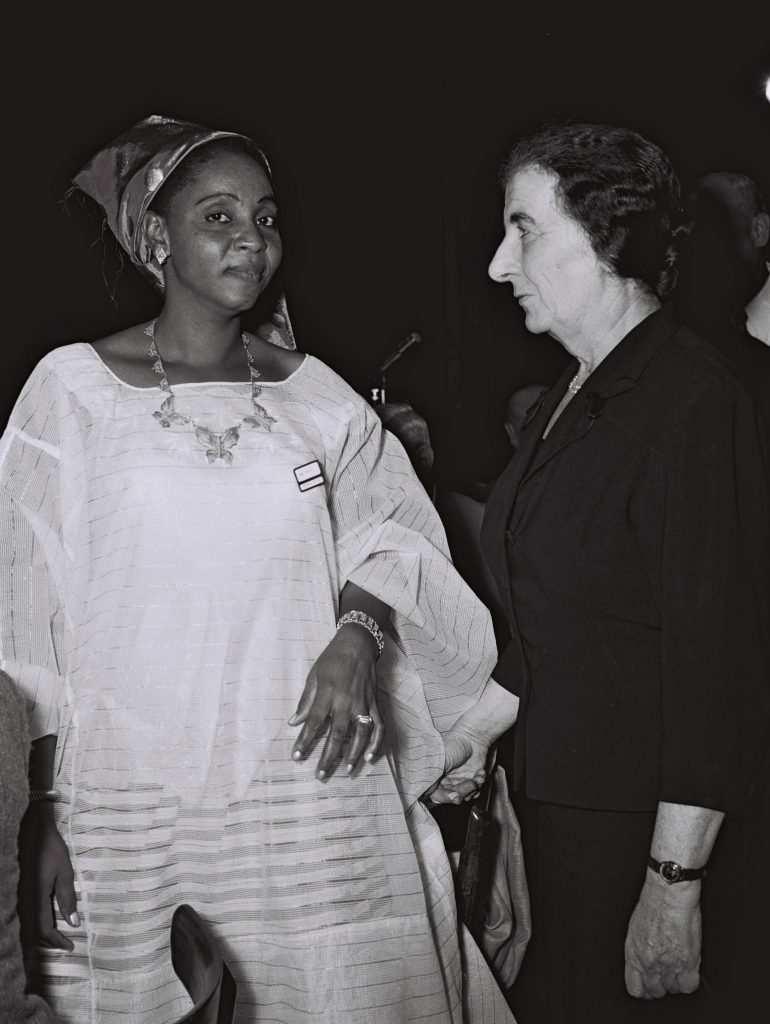
Foreign Minister Golda Meir with Mariam Keita Modibo of French Sudan (Mali), Afro-Asian seminar in Tel Aviv, 1958. Moshe Pridan GPO

